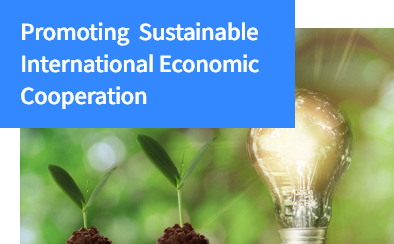

ESG Finance
KEXIM aims to strengthen the ESG competitiveness of Korea companies in global Markets and contribute to the creation of environmental and social values through ESG financing programs.
By 2030, KEXIM plans to provide ESG financing worth KRW 180 trillion including KRW 115 trillion for environmental sectors and KRW 65 trillion for social sectors, and increase the proportion of ESG financing up to 32% with 25% in environmental sectors and 7% in social sectors.
KEXIM is committed to fostering an eco-friendly and low-carbon industrial ecosystem by expanding its financial support for Green projects in areas such as highly fuel-efficient and eco-friendly vessels, rechargeable batteries, future mobility and renewable energy.
Furthermore, KEXIM will not only contribute to creating decent jobs in society through providing preferential terms to job-creating companies, but it will also facilitate to achieve social outcomes in line with its effort to promote win-win cooperation between large enterprises and small-and medium-sized enterprises (SMEs) and provide support for social infrastructure projects.
ESG Finance Target
Unit : (KRW tn)
ESG Finance Target table
| Content |
'21~'25 |
'26~'30 |
Total |
| |
(Total) |
76.5 |
103.5 |
180 |
| Environmental |
(Subtotal) |
47.5 |
67.5 |
115 |
| Social |
(Subtotal) |
29.0 |
36.0 |
65 |
Creation of environmental and social impacts through ESG finance
step1
Tool
Preferential Terms (Lower interest rates and fees)
step2
Ouput
Expansion of ESG Finance
step1, step2 common
Lower interest rates
- for companies promoting ESG values in society
- for companies reducing carbon emissions or with improving Environmental Performance Index
- for companies creating jobs
- for companies adopting ESG business practice and satisfying KEXIM’s ESG standards
step3
Outcome
Carbon Emission Reduction, Job Creation, etc.
step4
Impact
Creation of Environmental and Social Values
step3, step4 common
Lower fees
- Compensate cost for renewable energy development and power system related certificates
- Reduce fees equivalent to cost for environmental and social performance related certificate such as carbon emissions reduction, etc.